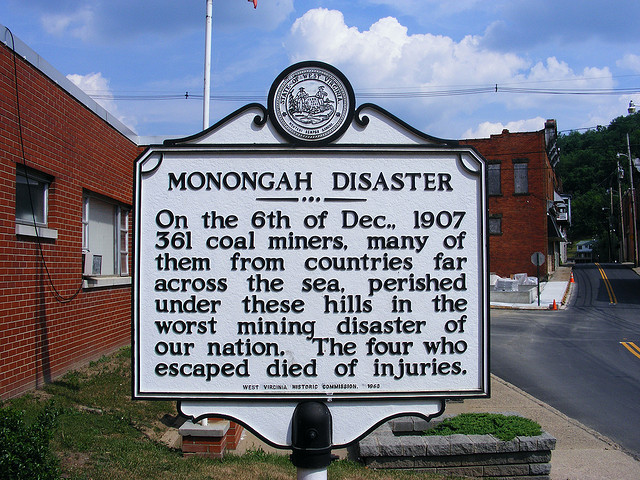I applaud David Roberts over at Grist for elevating a very interesting and timely conversation on worker transition for coal miners. On Monday he argued that the Democratic Party should simply cede Coal Country as collateral damage from the culture war, and instead focus on its base of environmentally minded liberals. And yesterday, in response to many tweets and comments, his blog asked the question, “Should the Feds Bail Out Coal Miners?” While I agree with many of his arguments, I’d have to disagree with his conclusion (in short, “no”) and offer some ideas about why protecting our coal workers is critical to successfully solving the climate problem.
Cultural identity
First, in full disclosure, I am from a third generation coal mining family in West Virginia, so this issue is quite personal. Today my brother works in the same mine that my dad retired from, and he’s really proud of his work. I can tell you that miners make good money and receive great benefits. While arguments about coal usually focus on the economic impacts of the industry (i.e., jobs) vs. the environmental damages (too long a list to expound upon in this post), the point that is mostly missed in these discussions is that coal is as much a cultural identity as it is an economic driver. We are very proud of our heritage, as we should be: our blood and sweat have helped keep the lights on in this country for well over a century—and some have paid the ultimate price for all of us to have the convenience of flipping on a light switch.

Historical Marker noting the 1907 mining disaster in Monongah, WV that claimed the lives of over 360 men.
Let me put it another way. For coal miners, watching politicians and advocates say that the coal industry is contributing to a dangerously warmer world must feel like someone walking into my office and saying, “Jeremy, your scientific research is destroying the planet, and you have to do something else now.” That sentiment would threaten not just my livelihood but also my identity.
While many workers live in communities that provide the opportunity for switching jobs (or even change to a new industry), that’s a luxury many coal miners don’t have. We are talking about communities that have been mining coal for generations—and there simply isn’t anything there to fall back on. This is why the loss of some 7,000 mining jobs in Central Appalachia over the last few years has been so devastating. On top of that—and I know it’s hard for some folks to understand—people have a connection to the hills of Appalachia that makes them unwilling to leave. That’s one reason that there was so much outrage at Annie Lowrey’s New York Times article this summer suggesting that the solution is everyone moving to the cities.
Historical context
You might rightly ask, “Well, why isn’t there anything to fall back on? Didn’t anyone see this coming?” It’s a question that requires some historical context. An entire subfield of economics studies the resource curse—the empirical fact that nations with large endowments of natural resources are slower to develop. Economists have identified many possible causes—poor (or corrupt) governance; lack of strong local institutions; and the fact that extractive industries tend to crowd out the need for more skilled workers. All of these factors are at play in Appalachia.
It is well documented that Appalachia’s wealth was simply stolen by outside interests. At the turn of the last century, all of the big coal and oil barons were based in the Northeast, and so, quite simply, that’s where most of the profits went. There was no incentive to invest in local infrastructure or people. Sadly, the problem of absentee ownership persists even today: in six of West Virginia’s counties, the top ten landowners control more than 50 percent of private land. In 2010, about 90 percent of West Virginia’s coal production (on a tonnage basis) was ultimately owned by out of state companies.
I would argue that we have a moral obligation as a society to the miners who are facing a declining industry through no fault of their own. Owners and operators of coal companies don’t get a pass here; for decades they have been well aware of the outlook for Central Appalachia, facing competition from other regions, limitations of geology, and mechanization. Where’s their concern for workers as they close up shop?
Politics
Maybe you don’t buy the moral argument. Still, there are practical reasons to care about coal miners. Regardless of the D or R after the Senator’s name, the concerns of Coal Country will remain, and that constituency will (and should) have a voice through their elected officials.
To put it simply, I believe that in order to solve the climate crisis, we have to figure out how to help Appalachia diversify its economy. Unless this region of the country can see itself as part of the clean energy economy that many of us are working toward, we will continue to struggle in making the transition.
A path forward
Roberts also mentioned Ken Ward Jr.’s account of the forum held in Charleston (WV) last September, called A Bright Economic Future for the Mountain State. I may be a bit biased (I was the driving force behind that event), but I would have to say that Roberts has underestimated the significance of that forum. The event brought together many diverse perspectives to participate in the discussion. One person even remarked that they could never recall all of these people being in the same room together. The point of that forum was to start a conversation, one that I found many people eager to engage in. I felt that in order to get people to come to the table, we needed to avoid getting stuck in that tired old jobs vs. the environment debate. Instead, we concentrated on the assets West Virginia has to offer and potential sectors for economic growth: tourism, advanced manufacturing, and so on.
And I’m excited to point out that conversations are continuing. A group of folks got together and organized a conference in June focused on climate impacts in West Virginia. And a series of dialogues called “What’s Next, West Virginia?” are beginning around the state, aimed at getting small local communities to talk about the future. It’s already having some amazing results—and these very nascent and fragile conversations must be supported. Roberts rightly points out that the Feds can’t do much without reliable local and regional partners, and efforts such as these are critical to building local support.
Thanks to David for elevating the discussion about coal miners and workers in the broader debate about how to address climate change. Let’s keep it going.
UPDATE October 15: Post updated for accuracy.
